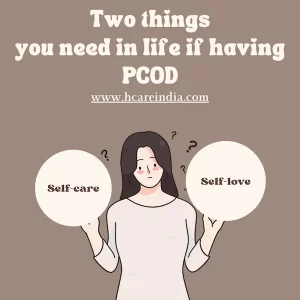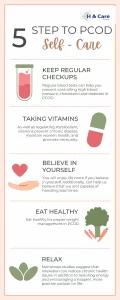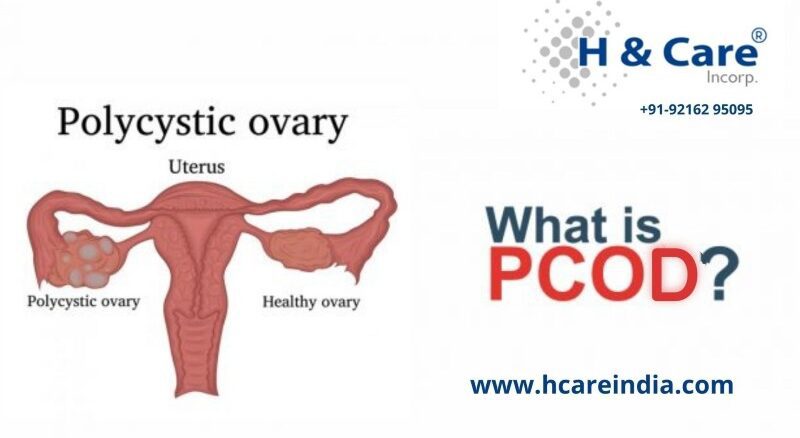What is PCOD (Polycystic Ovary Disease)?
When a woman has a number of small cysts in the ovaries, this medical condition is known as PCOD or Polycystic Ovary Disease. PCOD is the most common endocrine and metabolic disorder in women with 10% incidence rate.
PCOD is a kind of hormonal disorder because of hormonal imbalance that affects women. It is prevalent and affecting all women of different ages and at different stages worldwide.
Ovulation is a part of the menstrual cycle which occurs every month. It occurs when an egg is released from the ovary and is released into the fallopian tubes. Before releasing into the fallopian tube, these eggs develop tiny cysts called follicles. It is a medical condition where the ovaries release the eggs prematurely which turn into cysts over time. This causes irregular periods, weight gain, male pattern hair loss and abdominal pain. The ovaries become bigger in size and start to release higher levels of male hormones in the body. Besides unpredictable hormonal behaviour, this condition can trigger diabetes, infertility, acne and excessive hair growth.
PCOS is the most common cause of hirsutism and anovulation in females.
As PCOD is not a serious disease, it does not affect fertility in women. Women with PCOD can still ovulate and can get pregnant. They do not face problems in conceiving. Pregnancy is also free of complications for such women and they might need just a little help to make their conception and pregnancy smoother. Periods are normal and sometimes delayed.
PCOD is detected when a woman is not able to conceive.
Although PCOD can be caused due to obesity and unhealthy habits, it does not result in health complications like that in PCOS.

Chronic hormonal imbalance associated with PCOS and PCOD can affect various aspects of your overall health–
- Infertility – pregnancy can occur only if you ovulate. Since PCOS interferes with ovulation, it can lead to infertility. It is easily treatable / reversible. In fact, PCOS problems are a leading cause of infertility in women.
- Pregnancy complications: Increased abortions (due to decreased progesterone), gestational diabetes, still birth.
- Obesity – the erratic weight gain caused due to PCOS leads to obesity. Obesity, in turn, increases your risk of developing metabolic disorders such as diabetes, cholesterol and hypertension.
- Sleep apnea – sleep apnea is more common in obese women with PCOS leading to momentary breaks in breathing throughout the night that interrupts sleep.
- Mental health – PCOS can negatively impact your mental health leading to depression and anxiety.
- Endometrial cancer – when the uterine lining (endometrium) is not shed regularly, its build-up can increase the risk of endometrial cancer.
Females That are at High Risk of PCOS
- Obese or insulin resistance
- Type 1, 2 Diabetes Mellitus
- History of 1st degree relatives with PCOS
- On anti-epileptic drug has high risk for PCOS
Pathogenesis of PCOS
Etiology: Increased production of androgens by ovaries
Increased androgens
↓
Folliculotoxic effect
↓
Multiple small follicles with arrested growth
(On USG multiple small cysts)
↓
No dominant follicle
↓
No ovulation
Symptoms of PCOD/PCOS
The signs and symptoms of PCOD usually develop during the first cycle of menstruation at puberty. It may also develop later due to increased weight over the years.
This occurs because of unhealthy lifestyle habits, consuming junk food and being overweight.
Some of the common signs are–
- Irregular periods, occurring every 2 to 3 months (amenorrhea). You may observe irregular periods or delayed menstrual cycle due to the abnormality in maturation of the egg.
- Difficulty in getting pregnant due to irregular and delayed or failed ovulation. The abnormal levels of hormones prevent the follicles from maturing and releasing the egg, causing delayed or failed ovulation. This heavily affects the menstrual cycle and thereby your periods. Many women are diagnosed with PCOD when they visit the doctor regarding their unsuccessful attempts at getting pregnant.
- Heavy bleeding (Menorrhagia). Heavier than usual bleeding.
- Hair loss or excessive thinning of hair due to the increased production of male hormones in the body.
- Acne (excess androgen production can lead to oily skin and frequent breakouts) or pigmentation of the skin around the neck region (Acanthosis nigricans).
- Weight gain especially around the waist area and is extremely difficult to lose.
- Unusual body and facial hair growth (hirsutism).
Diagnosis of PCOD
No single test can diagnose PCOS and PCOD. Gynaecologist will ask about your symptoms, medical history, physical examination and if required a pelvic examination.
They might have your blood tests done to measure your hormone levels, blood sugar and cholesterol.
An ultrasound can check your ovaries for cysts, tumors and measure the lining of your uterus.
Complications
Short term complications
- Menstrual irregularities
- Hirsutism
- Alopecia
- Infertility
- Insulin resistance
Long term complications
- Dyslipidaemia
- High BP
- CAD
- Endometrial cancer
- Ovarian cancer
- Sleep apnea syndrome
- Mood disorders: depression, anxiety
Is PCOD Treatable?
There is no direct and quick treatment for PCOD. A multidisciplinary approach, including lifestyle and diet modifications, to manage individual concerns like infertility, blood glucose levels, restoration of fertility, regular menstruation and the prevention of endometrial cancer is popular.
The right diet can go a long way in helping you deal with PCOD.

The best measure to control this condition is the lifestyle modification. Even a 5% weight loss can lead to ovulatory cycles. Hypocaloric diet + brisk walking and exercise
Advantages of weight loss:
- To decrease central fat and improved insulin sensitivity.
- Increased sex hormone binding globulin gets decreased
- Androgen (free testosterone) levels
- In 5-10% females resumption of ovulatory cycles
- Medical assistance to reduce blood glucose levels, restoration of fertility and regular menstruation, effective treatment of acne, and the prevention of endometrial cancer are other measures that help weed out PCOD.
- Multidisciplinary approach is taken from the dietitian, gynaecologist, endocrinologist, dermatologist and infertility expert. It is always advisable to consult a gynaecologist to discuss the symptoms. Doctor would recommend various medications to rectify your menstrual cycle. He may also prescribe drugs such as combinatorial birth control pill. These pills contain progestin and estrogen that reduce the production of the male sex hormones and regulate your hormones that let follicles release the egg, form acne and excess hair growth.
- Doctors would prescribe drugs such as clomiphene, letrozole, metformin and gonadotropins to improve ovulation in PCOS.
- In PCOS, surgery is not the immediate option of choice. In severe cases, laparoscopic ovarian drilling is the option. It would help trigger ovulation which means the release of the egg from the ovaries.
Femista (division of H & Care Incorp), Best Gynae PCD Pharma Company, offers a wide range of gynae pharma products related to hormones, iron & calcium supplements, PCOD, PCOS, male and female infertility.
Company is committed for the uninterrupted supply of medicines. We aspire to work with a highly talented team of like-minded people. So, be a part of our team.
Also Read
Top 10 PCD Pharma Companies in India




